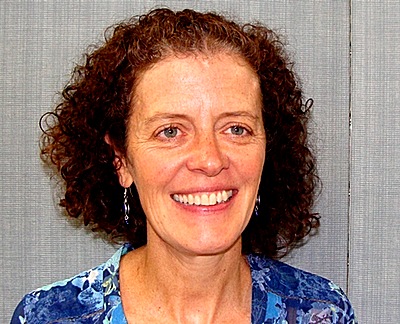- By Dan Veaner
- Around Town
 Print
Print  After considering 52 applicants the Lansing Board Of Education hired Colleen Ledley to replace the outgoing High School Principal Eric Hartz. Ledley is an accomplished educator and administrator who comes to Lansing from the Ithaca City School District. She will finish there on August 9th before taking the helm at Lansing High School.
After considering 52 applicants the Lansing Board Of Education hired Colleen Ledley to replace the outgoing High School Principal Eric Hartz. Ledley is an accomplished educator and administrator who comes to Lansing from the Ithaca City School District. She will finish there on August 9th before taking the helm at Lansing High School.She earned her undergraduate degree in Political Science at Colgate University with a minot in economics. She then worked for New York Public Interest Research Group (NYPIRG) and then SUNY Binghamton. After moving to Ithaca she volunteered for Congressman Matt McHugh, then became his assistant campaign manager, staffing two of his campaigns.
She earned her Masters of Teaching (MAT) at SUNY Binghamton, then got a job filling in for a teacher who had gone on leave at Ithaca High School. She was hired to teach Social Studies there, which she did for 18 years. After earning her administrative certification at SUNY Cortland she became leader of the 17 member department. Ledley implemented the Advancement Via Individual Determination (AVID) program, a national program designed to close the achievement gap for under-performing students. She then served as Associate Principal at Ithaca High School for three years during which time, among other things, she created a Response To Intervention (RTI) structure to helps students meet expectations. Currently she is South Hill Elementary School Principal, a job she finishes at the end of next week. She'll have the rest of August to come up to speed as Lansing High School Principal.
Originally from Brewster, NY Ledley and her husband have two teenaged girls, and two more from his previous marriage. She also considers the kids she touches as an educator as her very large extended family. Ledley met with the lansing Star Monday to talk about what she hopes to accomplish as Lansing High School Principal.
Lansing Star: Do you feel a particular connection to an individual age group?
So going to an elementary school after twenty-something years in a high school was a big step, but really trying to understand who they are and empower them as individuals was, to me, the most exciting piece of the job. So do I feel a connection? It's hard for me to say right now. What draws me back to secondary education is the college and career-readiness piece.
Students need a lot of support, particularly in the ever-changing world that we have and getting them to set goals and to reflect on those goals and help build their vision of who they are moving forward. You can do that in elementary school. Teachers do that all the time. What I saw at South Hill was that teachers do it really well. Students do benefit from that and as they move through the secondary system there are challenges that those students need more support in.
What attracted you to Lansing?
So a small high school that has a great reputation both for the teaching staff and support of education within the community made a lot of sense to me. And it's close to home.
Where there particular challenges here that particularly interested you? You probably have a very different point of view from Eric Hartz, who had a different point of view from his predecessor Michelle Brantner.
The school district said to me 'we're not looking for a manager. We're looking for an instructional leader' which is the work I want to do.
I also heard in the interview process (that the district wants) success for all kids, looking to close those gaps based on students' backgrounds. That has always been my mission as an educator and I want to continue to do that.
Thinking about Lansing as a smaller school, really being able to identify those who work with numbers of kids where it's very manageable on a personal level to make those differences.
 Colleen Ledley
Colleen LedleyBecause of the timing you haven't really had a chance to meet teachers and work with them, so in a way you'll be coming in cold. You must be strategizing about that -- how do you think that's going to work?
Certainly my first year is about relationships and learning. Learning about Lansing.
Does that include getting to know the leadership team and getting to learn the culture of the school while thinking about changes you might want to initiate?
I was really moved when I talked to Eric Hartz about his reasons for leaving the profession of teaching, including onerous state mandates, teaching to the tests, overloaded time commitments and declining aid and school revenues. How do you see those challenges? Especially as someone who is interested in curriculum, this makes a huge impact on the program a school can offer.
The shift to Common Core, which the State decided on a number of years ago, in my mind is a really good shift. The emphasis on non-fiction reading and the writing that's associated with that is terrific. As a social studies teacher it's what I always did so it makes a lot of sense to me and it brings in social studies and science in a way that sometimes gets left out with ELA and math. So in terms of curricular shifts I support those that the state has made.
In terms of the testing piece of it, the tests at a high school level, at least, haven't changed. They're still Regents exams. Might they change? Yes, for sure. And we'll see what comes with that.
I think the big change was the teacher accountability process with the number of observations, the scoring of teachers with a number that can sometimes be really deflating because it feels like you are summarized down to a number.
Again, it has to make sense to the mission. One of the things i think is a strength for me is coaching and talking about what happens in the classroom. It the observation and evaluation process allows that to happen, great. Use the tools that we have. The Danielson rubric is a good rubric. There is a lot in it, probably too many things at once. But it pushes both administrators and teachers to excellence. If we can tap into it and make it manageable for teachers, and that's my job as a leader, good things will come out of it.
So you are saying you will use the state process to realize local goals?
Yes, absolutely.
What are you going to do your first week of school?
My job is to allow teachers to do the teaching and to make it efficient and easy for them as much as possible. So making sure everything is in place and starting to build those relationships.
What are you going to do in your first week when you begin?
One of the things I'm going to work on immediately with Eric is to look at the master schedule -- we've been emailing electronically -- and look at the whole list of 'to dos' to see what is in place and what is not in place. I'll be working with Eric and Superintendent Pettograsso on the mission and vision of the district, the vision of the school, and the big picture.
As a building leader we have to live in both worlds simultaneously. We have to have the big picture in mind, yet we have to manage logistics day by day. Knowing who my go-to people are is really important. It requires the whole staff to make the building work well.
So I'll be getting to know the logistics, learning who the go-to people are, figuring out what still needs to be done, then doing some thinking about the mission and the vision. Looking into our data, looking at where students are right now, who are the incoming eighth graders into ninth grade, (determining) what kind of support we might need to put in place, and getting to know the students on paper and getting to know them in person.
The Superintendent is named Chris and the elementary principal is Christine. Are they going to make you change your name to 'Chris'?
That's a deal breaker. I won't do it!
I have a lot to say about how much secondary teachers can learn from elementary teachers. There may be a whole untapped body of knowledge there if only they have more opportunities to work together. I've connected on a national level with other educators who are involved in AVID, which is implemented across the nation and even internationally. I've done work at the Harvard School of Education.
So all of that gives me lots of ideas. I really need to see the context in which I'm working first before I make any wholesale changes. I want to share and work collaboratively with the staff on those things.
What are you looking forward to the most, both short and long term?
In terms of the long term I'm hoping and excited about Lansing maximize its own potential both with families and with the staff there.
v9i28



